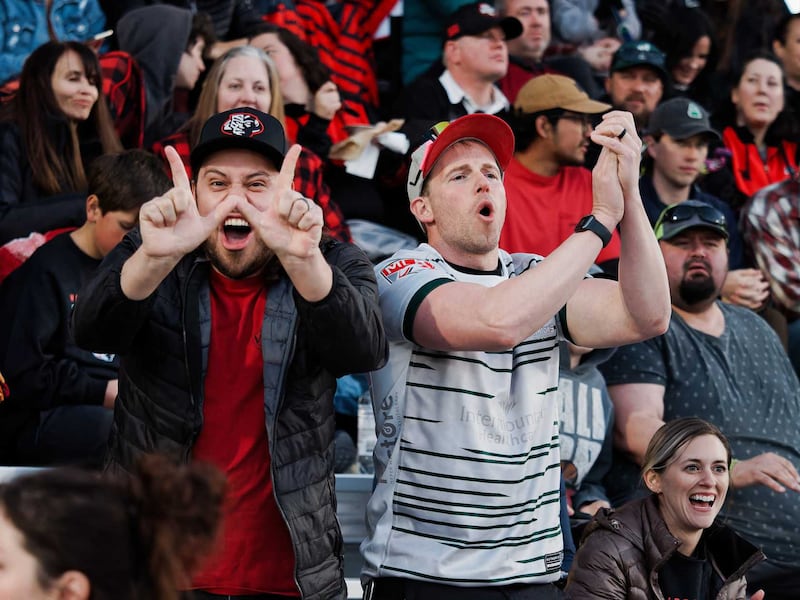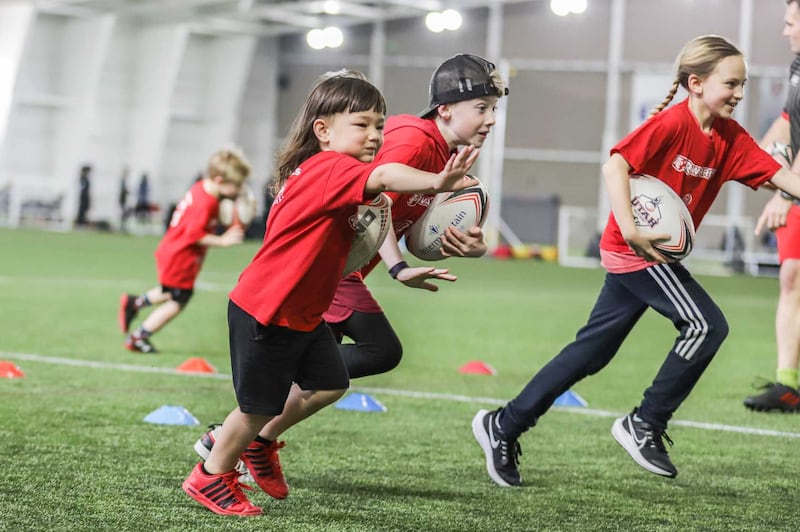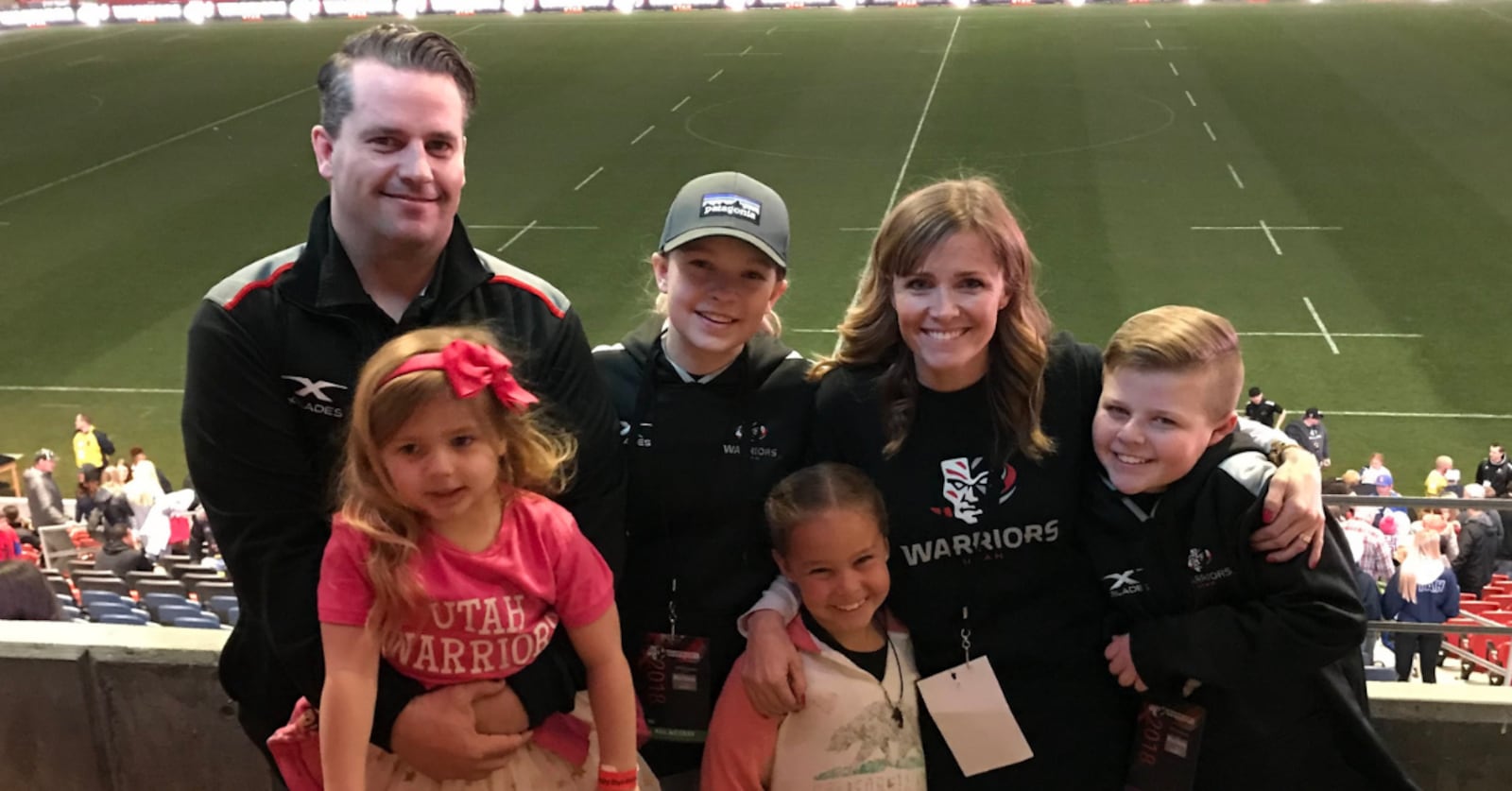I didn’t wake up one day and say to myself, “I’d like to start a professional rugby team.” In fact, I was more than happy doing what I was doing at the time. But the thing that attracted me to this business was the impact sports has on communities—especially for kids.
Community identities are built and sustained by sports. Everyone knows what it means to be a Pittsburgh Steelers fan, and everyone knows what the Lakers mean to the city of Los Angeles. Rivalries between Brigham Young University (BYU) and the University of Utah are something that can literally divide families along blue or red lines.
This type of passion is something very few businesses can replicate. You don’t see downtown parades celebrating Amazon’s annual earnings reports, even if they beat all industry expectations, do you? Nor do you often see adults and children wearing hoodies, hats or jackets with the logos of General Electric or Berkshire Hathaway. The power of sports teams is unrivaled in the level of impact that they can have on individuals, families, businesses—and, above all—our youth.
A game of hooligans played by gentlemen
Sports have always been a part of my life. Like most kids raised in Utah in the ‘80s, soccer, basketball, wrestling, football and other outdoor sports like skiing or snowboarding were a big part of everything I did.
But it was a chance interaction with my college roommate as a freshman that led me to take up the sport of rugby after I decided—at the last minute—that I didn’t want to follow through with the opportunity to wrestle for BYU. His brothers had all played rugby at the university, and when he said, “You should go and try out,” my response was, “Sure, why not.”
I may not have known all of the rules that freshman year, but my wrestling fitness carried me, and I was able to make the team. Following my freshman year, a mission call for The Church of Jesus Christ of Latter-day Saints took me to Brisbane, Australia, where my passion for the game of rugby deepened. This eventually led to a call-up with the USA National Rugby Team, the USA Eagles, after returning from my mission.
Through my six-year Eagles career, I saw what rugby meant to communities and what the sport did for kids in places like South Africa, New Zealand, France, England, Ireland and other countries. Rugby is one of the world’s largest sports, and despite its perceived brutality, it supports one of the world’s most inclusive cultures for all ability levels and walks of life. It also is led by a deep sense of respect and integrity that is unrivaled by any other top-tier professional or international sport. In fact, Winston Churchill once called rugby a “game of hooligans played by gentlemen.”
For example, after every professional and international match, opposing rugby teams—along with their staff and key supporters—get together for an after-match meal that sees each team’s captain share congratulatory comments, often offering a man-of-the-match gift to the opponent. Can you imagine if LeBron James and James Harden appeared at an after-game social and were asked to “congratulate” each other and their opposing teammates? It’s unthinkable in today’s culture of sports celebrity.
Rugby evokes something truly powerful in people that I believe is exactly what society needs. That’s why the Utah Warriors core values, as represented by the four stripes on each jersey, are community, family, tradition, and respect.
Building a league that can endure
After my time with the Eagles, I went into coaching and supporting the administrative aspect of the game of rugby at the local and national levels. This was essentially volunteer work while I built a professional career and grew a variety of businesses with some amazing business partners.
In 2015, one of these businesses was in the talent acquisition and executive search industry within the high-tech sector. We had worked with numerous Bay Area and Utah-based early and late-stage tech companies and were building a decent business within a highly competitive industry.
Around the same time, domestic and international momentum for a professional rugby competition in the United States was picking up. The first attempt at such a competition was called PRO, which stood for “Professional Rugby Organization.”
In the end, PRO lasted just one season in 2016. A window of opportunity arose after that failure, which led to the emergence of a different competition. Because I was involved in the rugby community, I was looped into various groups who wanted to help professionalize rugby in the States. While PRO used a single-owner model, which inevitably led to its downfall, there were a number of people who began exploring how a new league could withstand possible financial struggles or other issues that are inherent with all sports startups.

Around that time, Major League Soccer (MLS) was a little over 20 years old. We saw the MLS model as the ideal way to establish and sustain an emerging sports league in America. Some might recall that the MLS had contracted and was on the brink of dissolution after 10 years of operation, but it was the MLS business model—which was different from the NFL, the NBA and others—that eventually led to the league withstanding those growing pains.
This model, called a single-entity model—or basically an LLC partnership concept in nature—was able to minimize costs while also sustaining the competition as a whole, assuming teams would undoubtedly face financial troubles early on in challenger sports and leagues. Using this model, the other partners would be able to sustain the health of the league by carrying the load with the other league members.
When we met as interested parties for the first time in 2016 in Houston, TX, to consider how to best set up a league that would withstand the forces that looked to challenge it, we knew the MLS model was Major League Rugby (MLR)’s best bet to grow another global challenger sport in North America.
We founded the MLR competition in 2017 with seven teams ahead of the 2018 launch in Seattle, San Diego, Utah, Denver, Houston, Austin and New Orleans.
A strategic save
The early days of the Warriors were not financially solid, to be honest. Much of the early funding for the team was managed by a small group of friends, family and my own resources. Setting up a professional sports team from the ground up requires plenty of financial runway.
One of the team’s most pivotal moments came in late 2019 after we had completed two MLR seasons. The Warriors’ capital partners had tapped out, given the rising costs that it takes to be competitive, and the only likely solution was to sell the team in order for it to survive.
In December of 2019, we were in the final stages of due diligence to sell the Warriors to another group when I received a text message from a number I had never seen before. It said, “I know [John Doe], and I’d like to talk to you about investing in the Warriors and rugby.”
I had fielded plenty of conversations about funding for this upstart team. Some conversations were legit; others lacked substance. But any founder of a company will know exactly how that goes—you have to talk to lots of people before you find the right partner to back you.
So, after four days of not responding to the text message, I decided, “What the heck, what do I have to lose?” To my grateful surprise, this person still wanted to meet up.
After meeting, it became clear that our goals and expectations aligned. We quickly began a healthy conversation around his involvement with the team. Out of respect for this individual’s wish to remain private, I won’t disclose his name; but this partnership led to the private equity firm Tamarack Fund, which became the majority owner of the Utah Warriors.
We were days away from completing a deal to sell the Warriors to an outside group, but this seemingly inconsequential text message led to the game-changing partnership that has proven to be consistent with our goals of building something truly impactful for the state of Utah.
From this, I came to learn that sometimes we can do everything we possibly can to control the outcome, but either the bounce of the ball or a random interaction ends up being the thing that changes the entire deal altogether. Of course, you don’t realize those types of opportunities without first putting in the work.
Missed opportunities
While the involvement of Tamarack Fund helped turn the tide for the Warriors, we were far from being a sure bet.
In 2020, the world was dealing with an unprecedented global pandemic. The MLR and the Warriors were fighting, like all sports leagues and teams, not only for ways to carry on the business but for survival.
It was right before the COVID-19 shutdown that another unexpected conversation was offered up to me, which led to what I could say is my biggest business regret with the Warriors. In February 2020, my prior business partner sent me an email that had been forwarded to our business website. It came from the representatives of a very well-known actor asking to connect with me about the Utah Warriors.Just like the text message from a few months prior to that, I didn’t know what to expect, but I set up the conversation nonetheless. After a few initial exchanged emails and calls, a conversation was set up between the Warriors, this celebrity, and his full set of representatives.
This actor was just finishing a very successful run on TV and was in the process of relocating to Utah. He was interested in being an ambassador for the Warriors, given his passion for the sport of rugby. He was also looking at a small minority investment in the team to be able to say he was an “owner” of the team as part of this ambassador role.
The conversation with this celebrity eventually broke down, not because of this actor’s lack of interest, but because we got greedy. Instead of taking this celebrity up on the terms that he and his representatives proposed, we countered with a larger investment commitment, assuming that any investment in the team would need to be on par with the other members of the ownership group.
We justified this proposal given the “equality” that all members needed to have inside of the partnership, overlooking the value his celebrity status could offer the organization. We believed we were treating him respectfully by countering like we would any other potential investor.
In hindsight, having this celebrity involved with the Utah Warriors would have been a gamechanger for an emerging sports brand like ours. While this mistake wasn’t existential, it certainly is one that I look back on with serious regret. The Utah Warriors and the sport of rugby are fighting for media market share, and are also fighting for the minds and hearts of communities. This celebrity’s ambassador role could have helped develop value and market awareness in the state and beyond.
The Jr. Warriors program
The greatest satisfaction I get to see on a regular basis is the smiles, laughs and excitement that boys and girls from all over the state experience through our Jr. Warriors program. This program—modeled very much after Junior Jazz, which I grew up playing—is built to introduce the sport of rugby to kids ages 6-14 through noncontact skills, drills and games.
In 2023, the Jr. Warriors program introduced the sport of rugby to over 50,000 kids in Utah. But more importantly, it introduced the values of this sport to those kids, their parents, their teachers and many more in our community.
Whether through the Jr. Warriors pregame clinics that we host on gamedays, the leagues that the Utah Warriors help sponsor with various city parks and recreation groups or the hundreds of teachers our community managers work with to teach how fun rugby can be for kids to learn in school, there is a special confidence and happiness that comes from kids learning and loving the sport of rugby. Heaven knows our kids need more confidence and happiness in their lives in our day and age.
Bracing for rugby’s ascent
Rugby is on the cusp of something transformational in the States. World Rugby announced the Rugby World Cup will be hosted in the U.S. in 2031 (men’s) and 2033 (women’s). Rugby 7s will be heavily showcased at the 2028 Summer Olympics in Los Angeles.
But closer to home, Utah is poised to push and lead this transformation. The sport’s roots began in the state in the late 19th century, and they run deep with one of the world’s largest Polynesian communities outside of Polynesia. Utah’s high school, collegiate and club rugby communities boast some of the highest championship rates of any community in the United States. Teams like Highland Rugby took home a record 20 high school national titles. BYU boasts seven men’s and women’s titles, while multiple men’s and women’s club teams have won numerous 15s and 7s titles on the national stage over the years.
The goal of the Warriors is to leave this state better than when we found it, but we are doing so by standing on the shoulders of one of America’s top-performing rugby communities. The Warriors are only here because thousands of other men, women, boys and girls have made Utah into a veritable epicenter of the game in North America through their hard work, dedication and sacrifice.
Over the last 30 years, I have had countless conversations with first-time rugby spectators. The comments are usually something like, “I didn’t really know what was going on, but I loved it!”
With its intense tackling, hitting, nonstop physicality and skill, rugby is the perfect combination of most major North American sports. That’s why I believe most Americans are rugby fans—they just don’t know it yet.
For me, the off-field respect and camaraderie woven into the sport of rugby drive even deeper than the hits and tackles. I know the magic of this sport will grip Americans in time; the real magic of rugby is the respect and confidence that it will instill in our rising generation of boys and girls. While I might have stumbled into the sport, I hope the legacy of the Utah Warriors will allow future generations of Utah kids to learn and love the amazing sport of rugby.


